With lofty mountain peaks, hiking trails that lead to alpine lakes and waterfalls, wildlife, and a scenic drive along one of the highest roads in the USA, Rocky Mountain National Park is a joy to explore. In this post, learn about the best things to do in Rocky Mountain National Park with tips on how to have the best experience.
Best Things to Do in Rocky Mountain National Park
1. Drive Trail Ridge Road
Trail Ridge Road is the highest paved through road, not only in Colorado, but also in the entire US national park system.
For 48 miles, this road runs from Estes Park in the east to Grand Lake in the west. 11 miles of this road is located in the alpine tundra, which is above the treeline. It reaches its highest point at 12,183 feet. Trail Ridge Road crosses the Continental Divide at Milner Pass.
This is a gorgeous drive. Along the way, there is a good chance that you will spot bighorn sheep and elk. The views from the overlooks are stunning. A few great hikes start and end along this road. And you can also visit the Alpine Visitor Center, the highest visitor center in the USA.
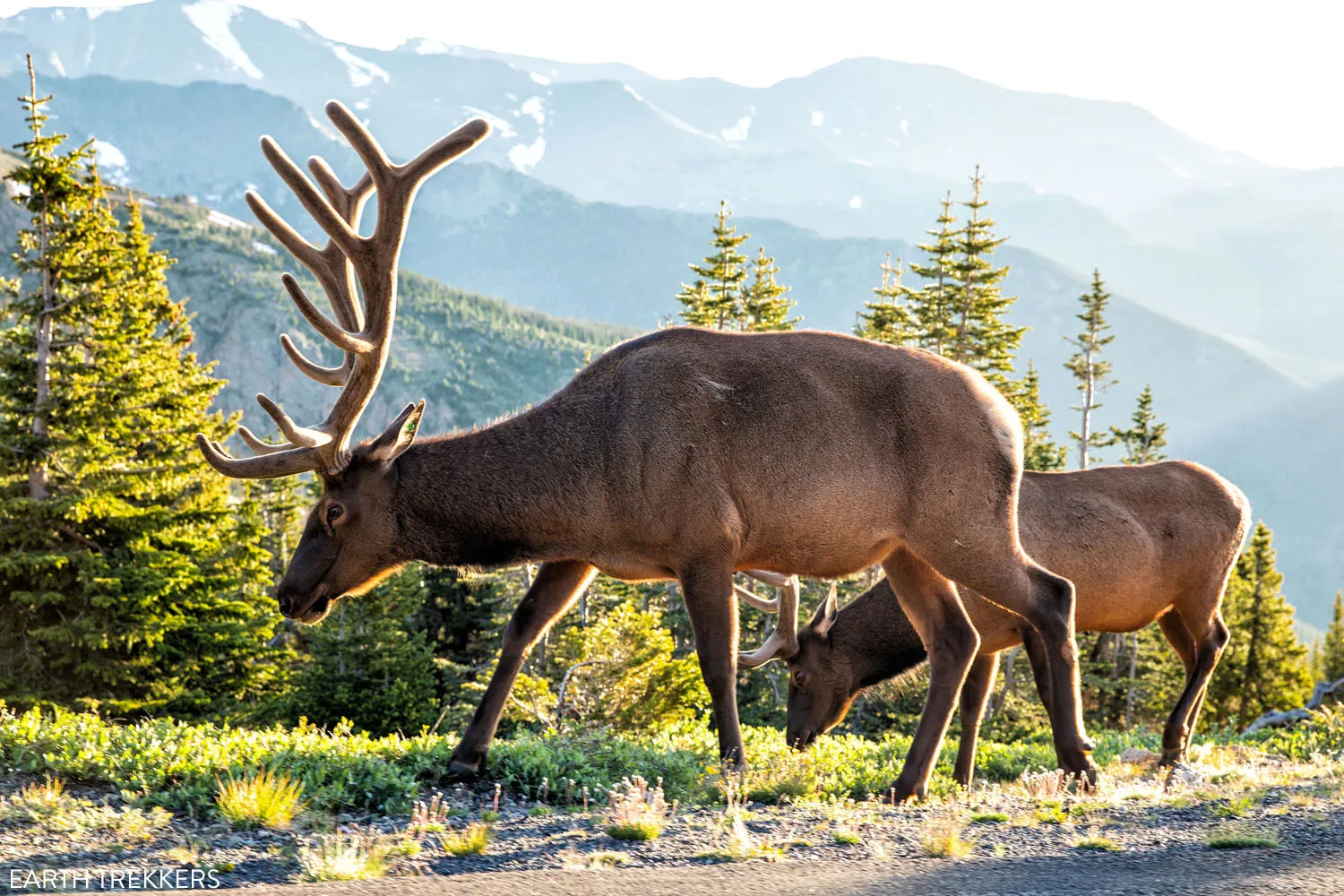
Elk on Trail Ridge Road | Best Things to Do in Rocky Mountain National Park
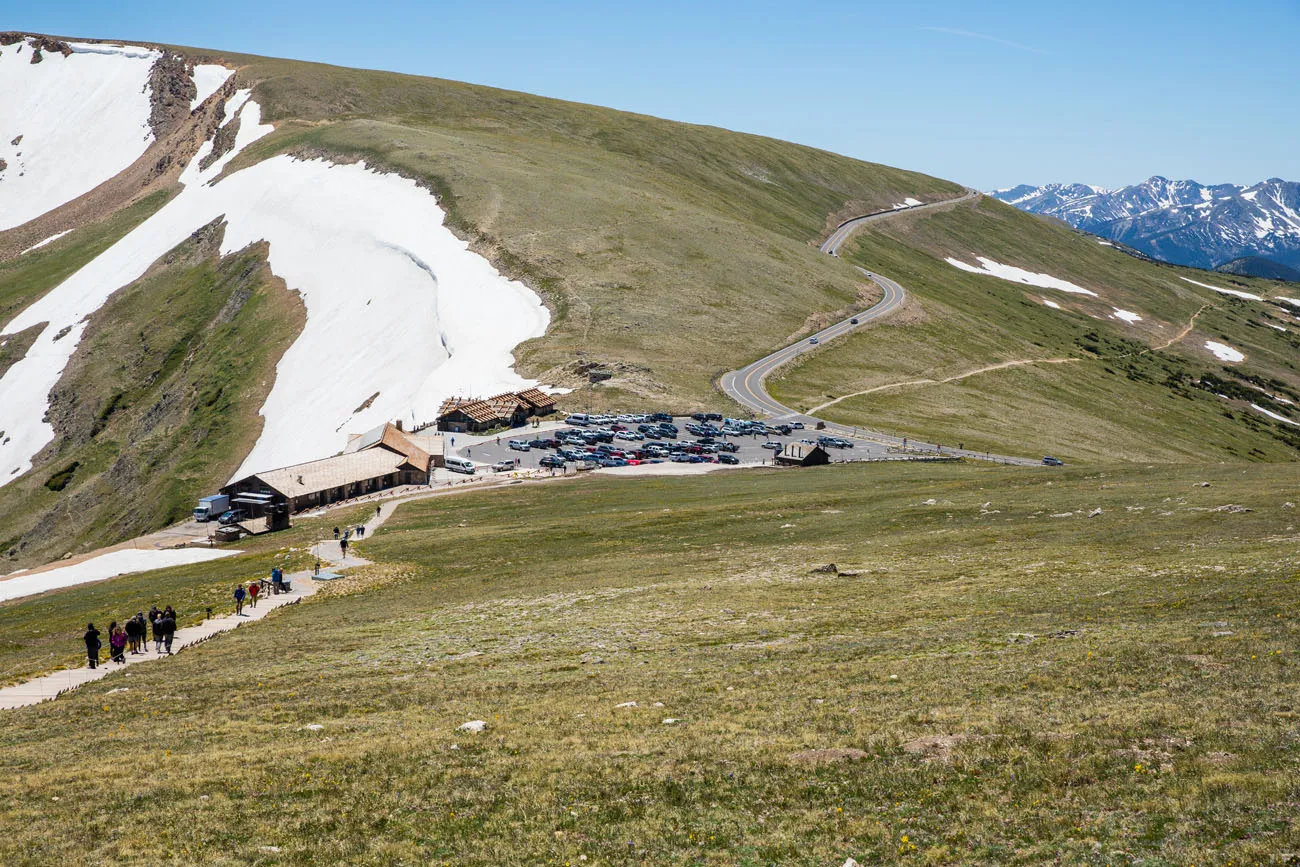
Alpine Ridge Visitor Center and Trail Ridge Road | Best Things to Do in Rocky Mountain National Park
Important: Trail Ridge Road is typically open from Memorial Day through mid-October. During the remainder of the year it is closed due to snow. Get updated road conditions on the National Park Service website.
PRO TRAVEL TIP: It can be 20 to 30 degrees cooler on the alpine tundra than in Estes Park or Grand Lake. Make sure you bring extra layers, even during the summer months. On an early morning in July, it was only 34 degrees at the Alpine Visitor Center during our visit.
2. Forest Canyon Overlook
This is one of the best overlooks located along Trail Ridge Road. At this viewpoint, you will be standing at 11,716 feet and have panoramic views of Longs Peak, Stones Peak, Hayden Gorge, and Gorge Lakes.
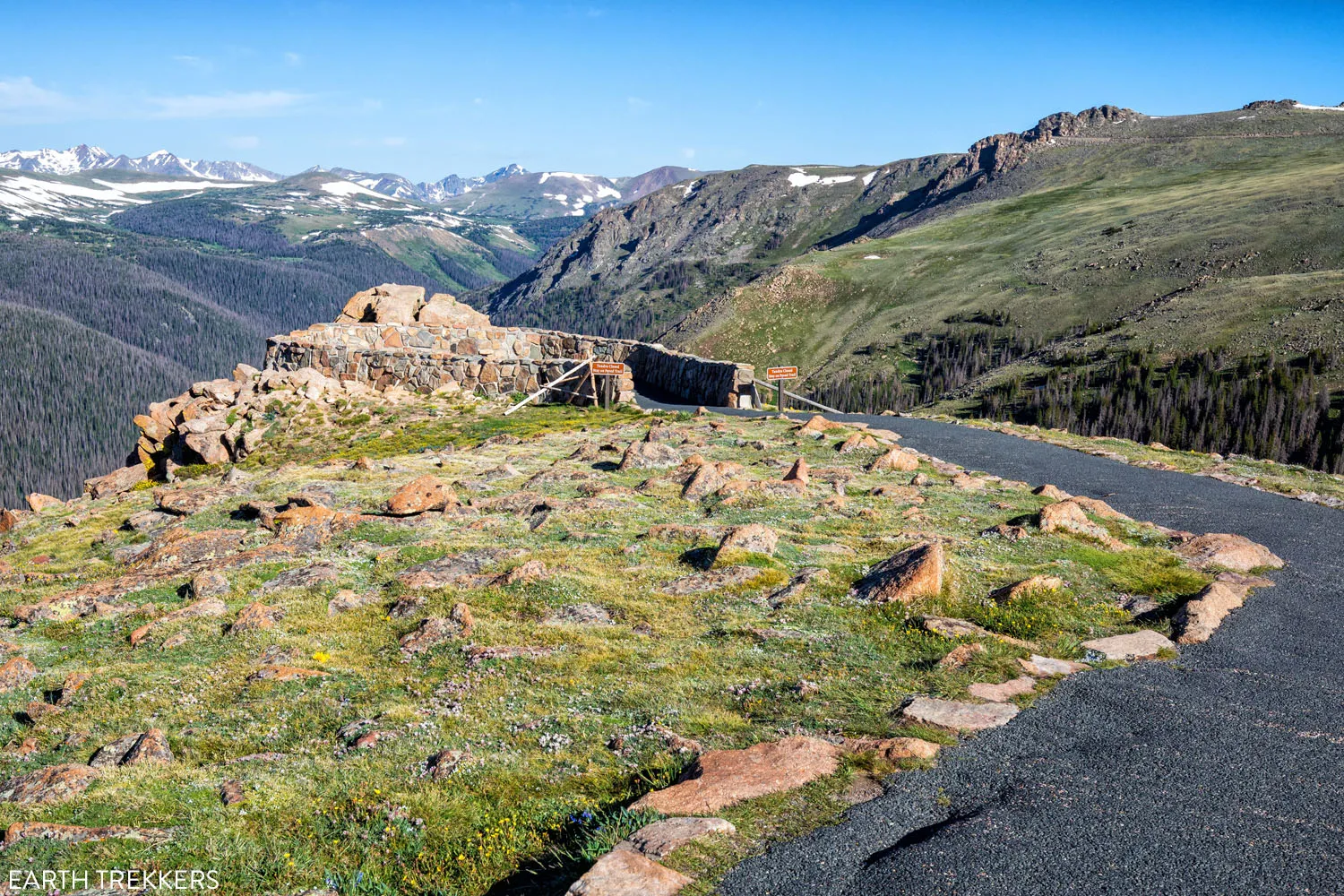
Forest Canyon Overlook | Best Things to Do in Rocky Mountain National Park
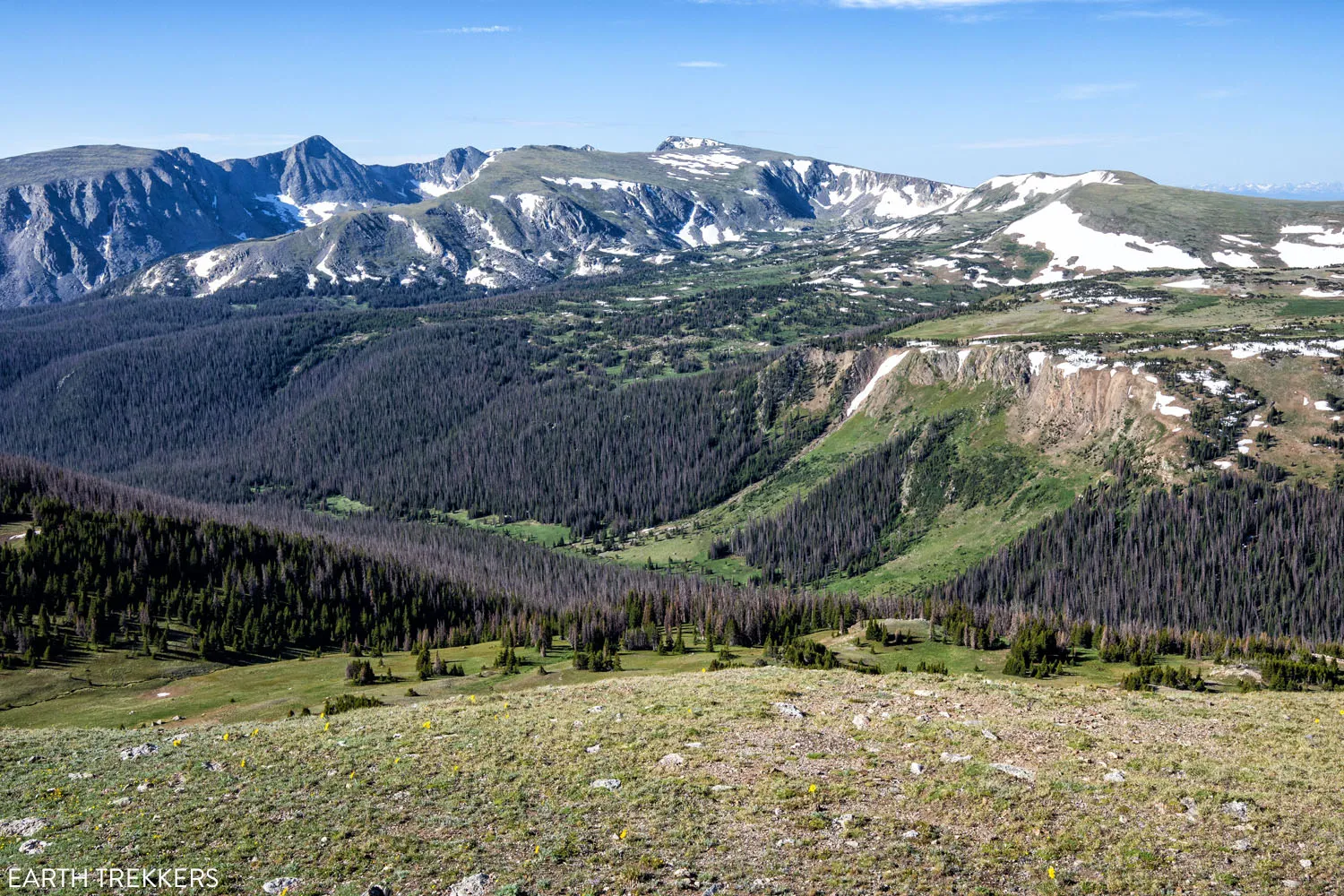
View from Forest Canyon Overlook | Best Things to Do in Rocky Mountain National Park
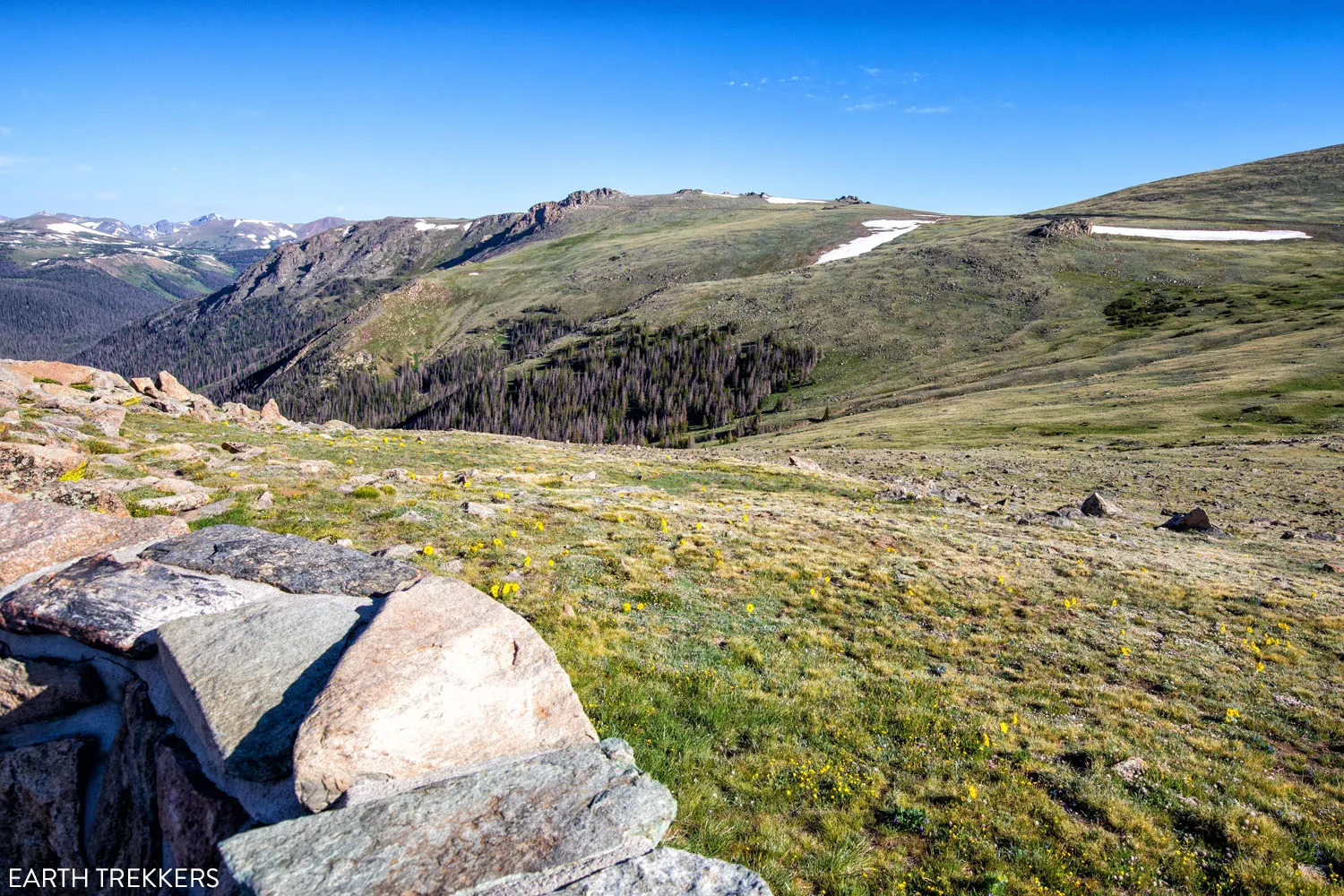
3. Go Hiking
There is no better way to experience Rocky Mountain National Park than from a hiking trail. And there are many to choose from. With 355 miles of hiking trails, you could spend weeks here and never run out of things to do.
From short, easy strolls around lakes, to ridgeline trails with panoramic views, to challenging but epic climbs to the tallest mountain peaks, there truly is something here for everyone.
Here is a list of some of the best trails in RMNP, starting with short, easy hikes and ending with longer, full day (and very worthwhile!!) hikes. All distances are round-trip.
Alpine Ridge Trail. 0.6 miles, easy. This very short hike takes you to a panoramic viewpoint of Rocky Mountain National Park. Not only will you have amazing views of the Rocky Mountains, there is a good chance that you will get to see elk along the way. This hike is located next to the Alpine Visitor Center.
Gem Lake. 3.4 miles, moderate. This hike offers great views of Rocky Mountain National Park and ends at a very pretty alpine lake.
Ute Trail to Tombstone Ridge. 4 miles, easy to moderate. This is our favorite short, easy hike in the park. For 4 miles, you hike through the alpine tundra with awesome views of Longs Peak and the Continental Divide.
Nymph, Dream & Emerald Lakes. 3.6 miles, easy to moderate. This hike is one of the best things to do in Rocky Mountain National Park. On this hike, you get to see four beautiful alpine lakes over a very short distance. It’s a great hike for families and makes a great intro to hiking in the park.
Deer Mountain. 6.2 miles, moderate. Deer Mountain is one of the easiest mountain summit hikes in the park. From the peak you will have a great view over Moraine Park and out to Longs Peak.
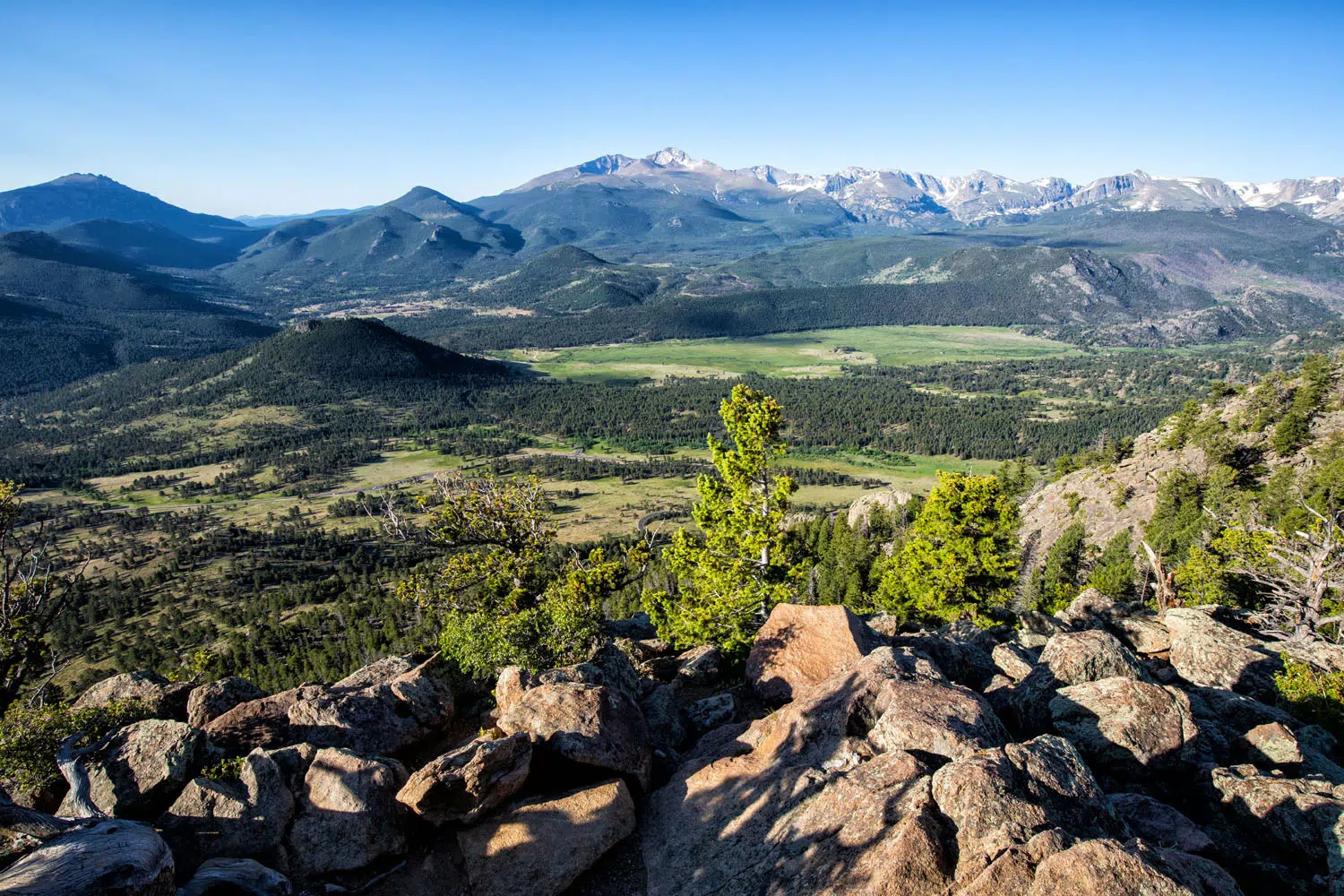
View from Deer Mountain | Best Things to Do in Rocky Mountain National Park
Twin Sisters. 7.4 miles, moderate. Located on the eastern edge of Rocky Mountain National Park, you get panoramic views of Longs Peak and Estes Park from the top of the Twin Sisters Peaks.
Odessa Lake & Fern Lake. 7.5 to 10 miles, depending on the route you choose. The hike to Odessa Lake and onward to Fern Lake is a relatively low-traffic trail in Rocky Mountain National Park. Its nearby neighbors of Bear Lake, Emerald Lake, and Dream Lake get a lot more visitors, so if you are looking for a relatively uncrowded trail with the chance to visit multiple alpine lakes, this is a nice hike to consider.
Sky Pond. 9.5 miles, strenuous. Sky Pond is one of the best hikes in Rocky Mountain National Park for good reason. This hike has a little bit of everything…waterfalls, alpine lakes, high mountain views, and fun river and stream crossings.
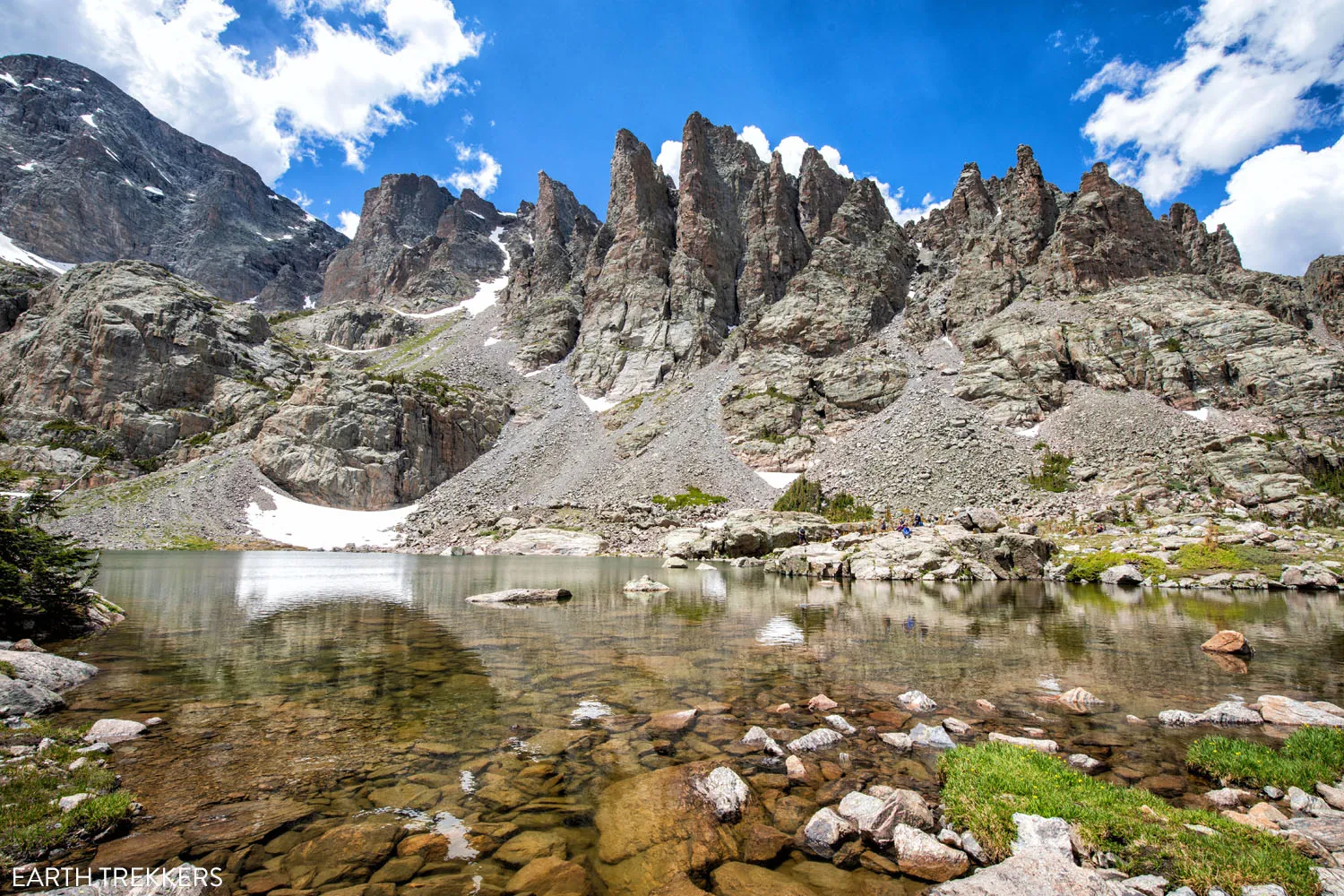
Sky Pond | Best Things to Do in Rocky Mountain National Park
Chasm Lake. 9 miles, strenuous. Hike 9 miles round-trip to a spectacular alpine lake with close-up views of Longs Peak. This is a must-do hike for avid hikers.
Continental Divide Trail to Mount Ida. 9.8 miles, strenuous. On the hike to Mount Ida, you really feel like you are walking on top of the world. For much of the hike you are walking along the Continental Divide. During this time, you get to enjoy panoramic views of Rocky Mountain National Park. It’s 10 miles long and tops out at almost 13,000 feet, so it’s a tough hike, but the views are incredible.
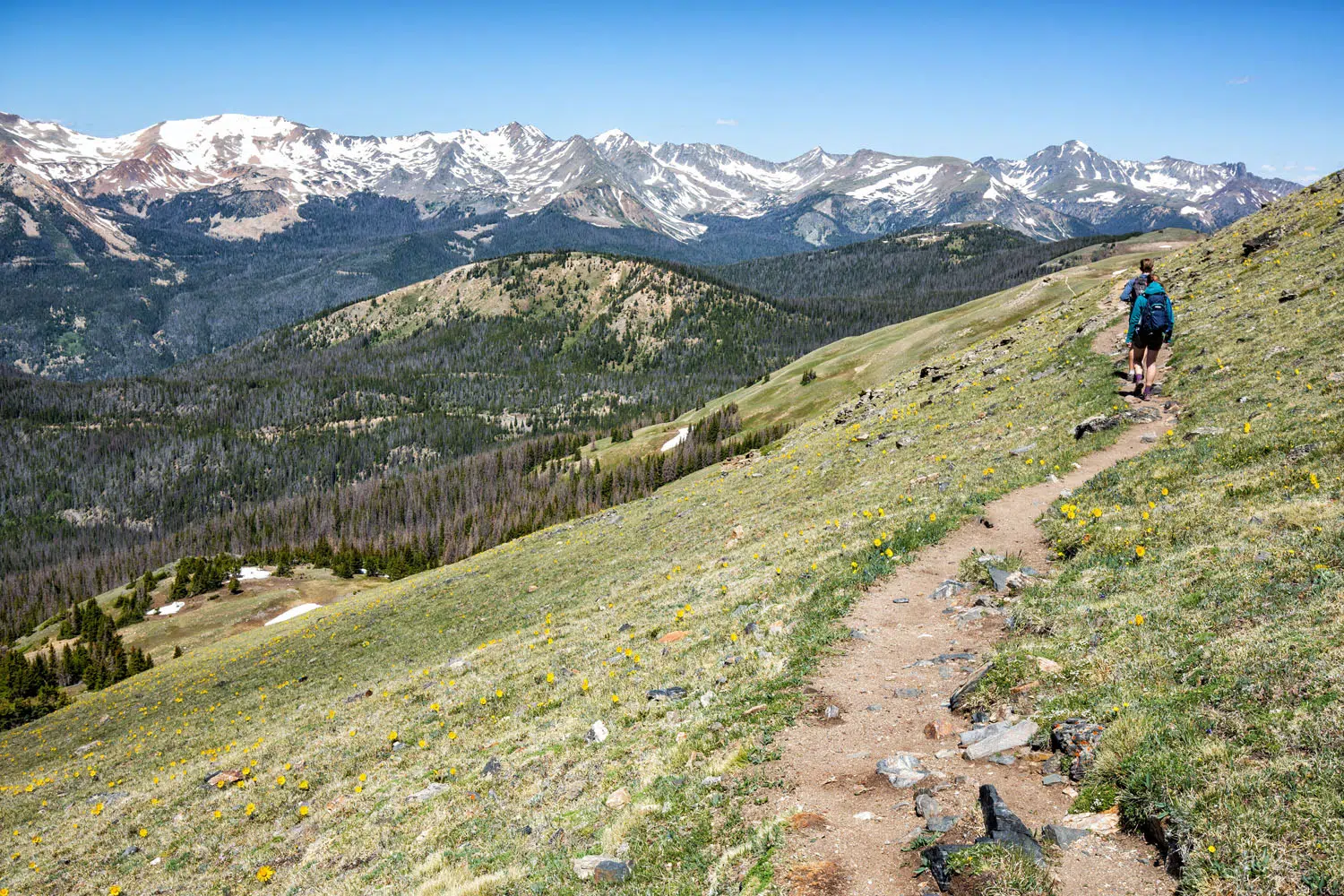
Continental Divide Trail to Mt Ida | Best Things to do in Rocky Mountain National Park
Hallett Peak. 10.4 miles, strenuous. This hike starts at Bear Lake and ends on the summit of Hallett Peak. At 12,718 feet, you get 360° views of Rocky Mountain National Park.
Longs Peak. 15 miles, extremely difficult. At 14,259 feet, the only fourteener on this list, the trek up Longs Peak is one of the most epic hikes in Rocky Mountain National Park. During the 15 miles of hiking, you will ascend more that 5,000 feet. On the Keyhole Route, the hike ends with some serious rock scrambling and lots of exposure. Over 60 people have died attempting to summit Longs Peak.
Get more information, and see many more photos, in our post 15 Great Hikes in Rocky Mountain National Park
PRO TRAVEL TIP: Because of the park’s high altitude, you will need to take a few days to acclimate to the altitude, if you come from a lower elevation. Spend the first few days hiking the lower trails (Bear Lake, Emerald Lake, Gem Lake, and Deer Mountain are good options). Then move up to the higher hikes, such as Sky Pond, Chasm Lake, Hallett Peak, and Longs Peak.
4. Bear Lake
This is the shortest, most popular hike in Rocky Mountain National Park. It’s a flat, beautiful, easy walk in the park…literally.
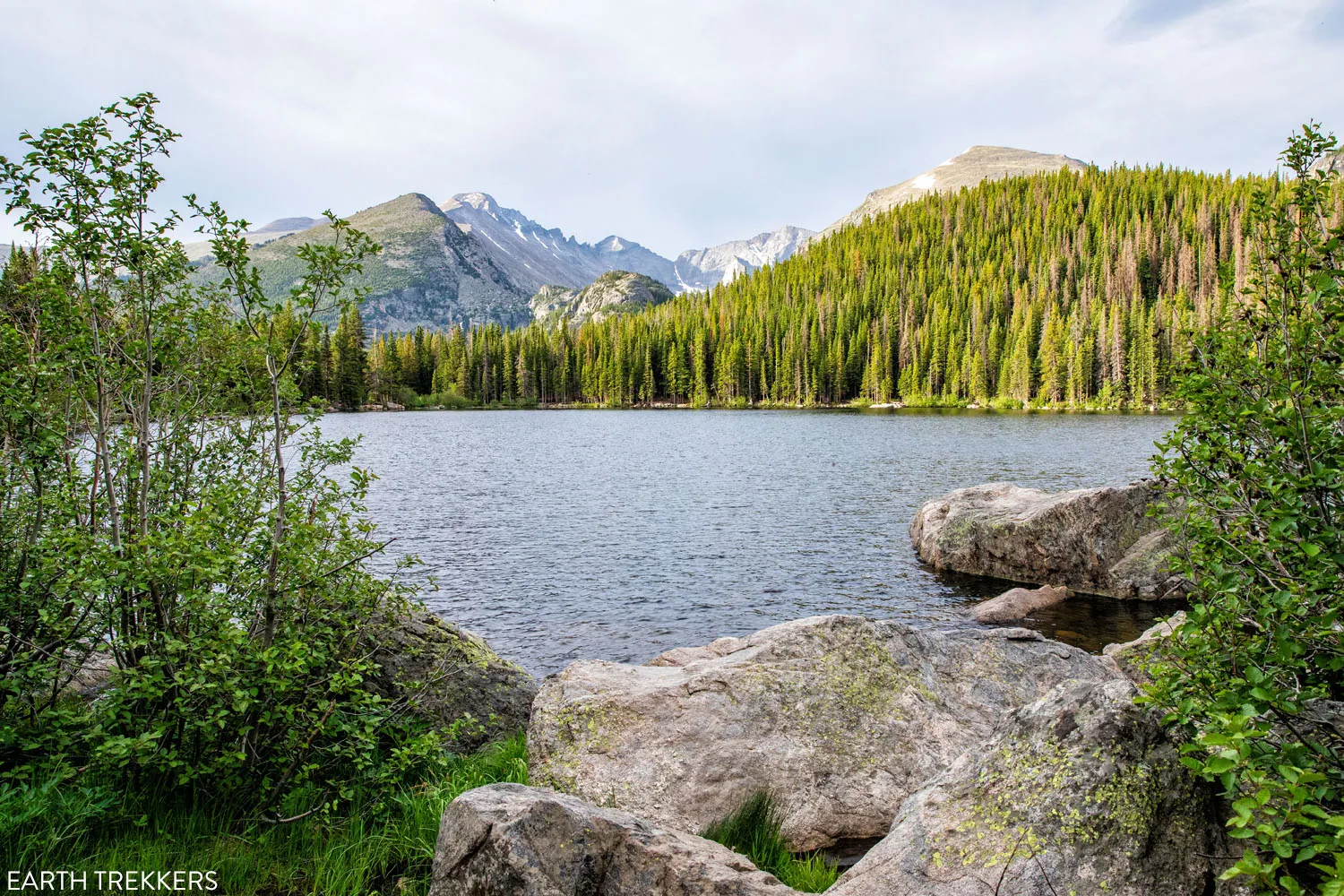
Bear Lake | Best Things to Do in Rocky Mountain National Park
The entire hike is 0.6 miles long, making it great for all ages and ability levels. This trail is not paved (it’s a gravel trail for most of its length) but it is considered handicap accessible.
Not only is this a scenic walk around a lake, but this also can be a learning experience. For about $1, you can purchase the interpretive guide at the trailhead, which takes you through 30 marked spots along the trail that teaches you about the Bear Lake area.
5. Alberta Falls
Alberta Falls is one of the most popular waterfalls to visit in Rocky Mountain National Park. Like Bear Lake, it is an easy hike to get here.
From the Glacier Gorge parking lot, is a mostly uphill walk to get to Alberta Falls, but it is not too strenuous. Once at the waterfall, you can explore the short trails along Glacier Creek to find your favorite view of the waterfall.
This hike is 1.7 miles round trip and takes 1 to 1.5 hours.
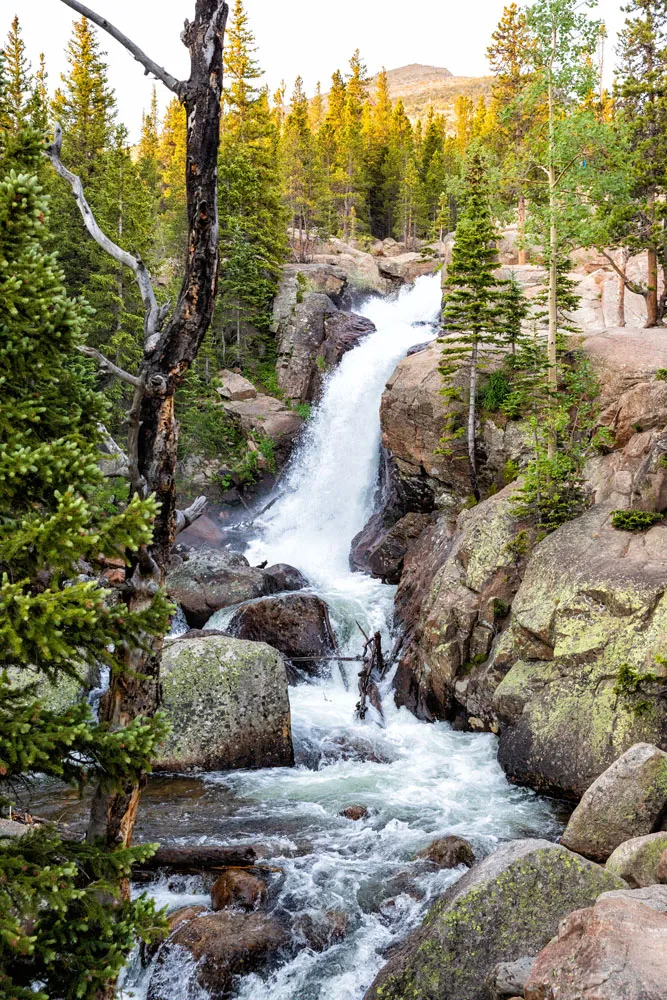
Alberta Falls | Best Things to Do in Rocky Mountain National Park
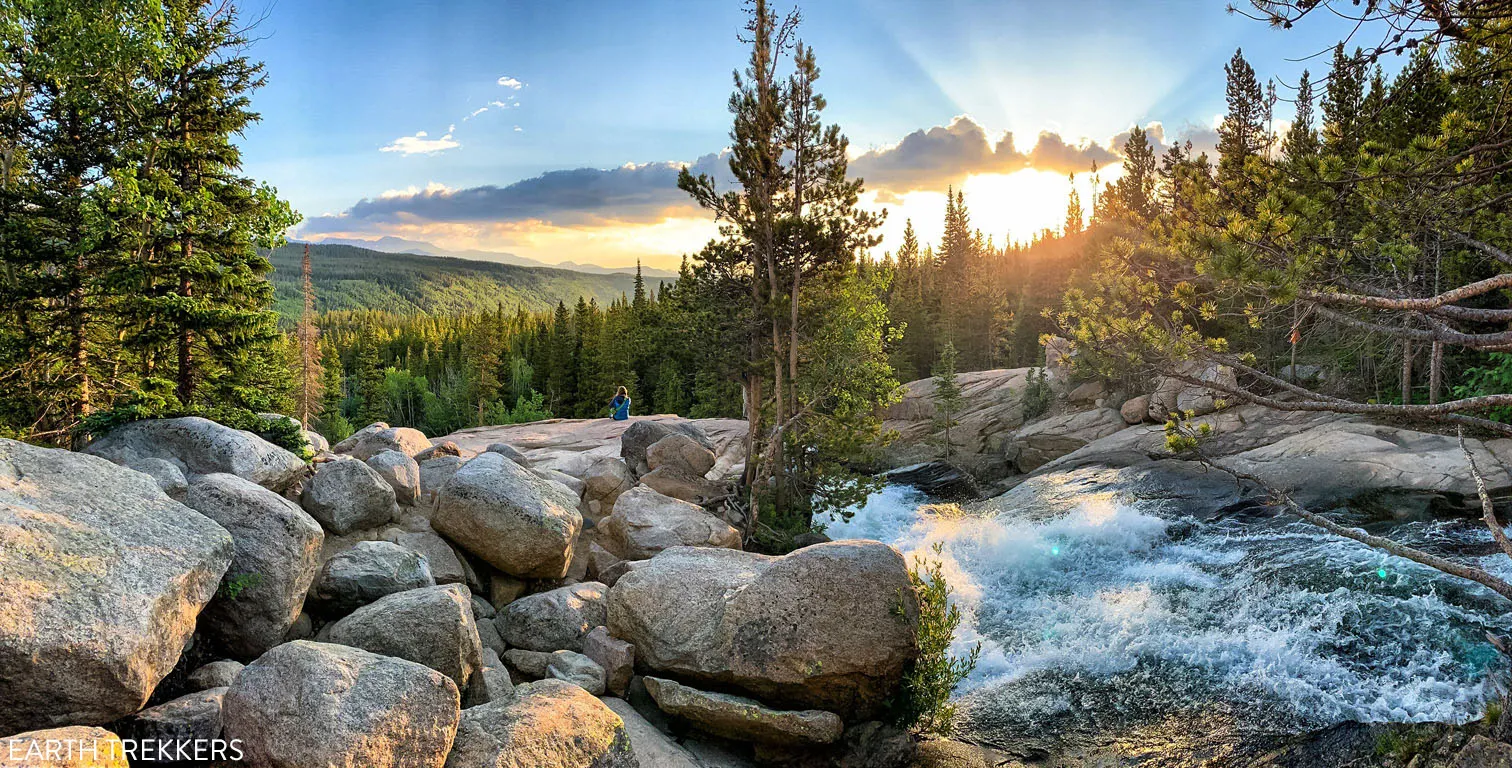
Alberta Falls at sunrise | Best Things to Do in Rocky Mountain National Park
6. Moraine Park
Moraine Park is one of the best places in Rocky Mountain National Park to see wildlife. Herds of elk can be found grazing in this valley.
Numerous hiking trails also start here, including those to Bear Lake, Fern Lake, and Mills Lake.
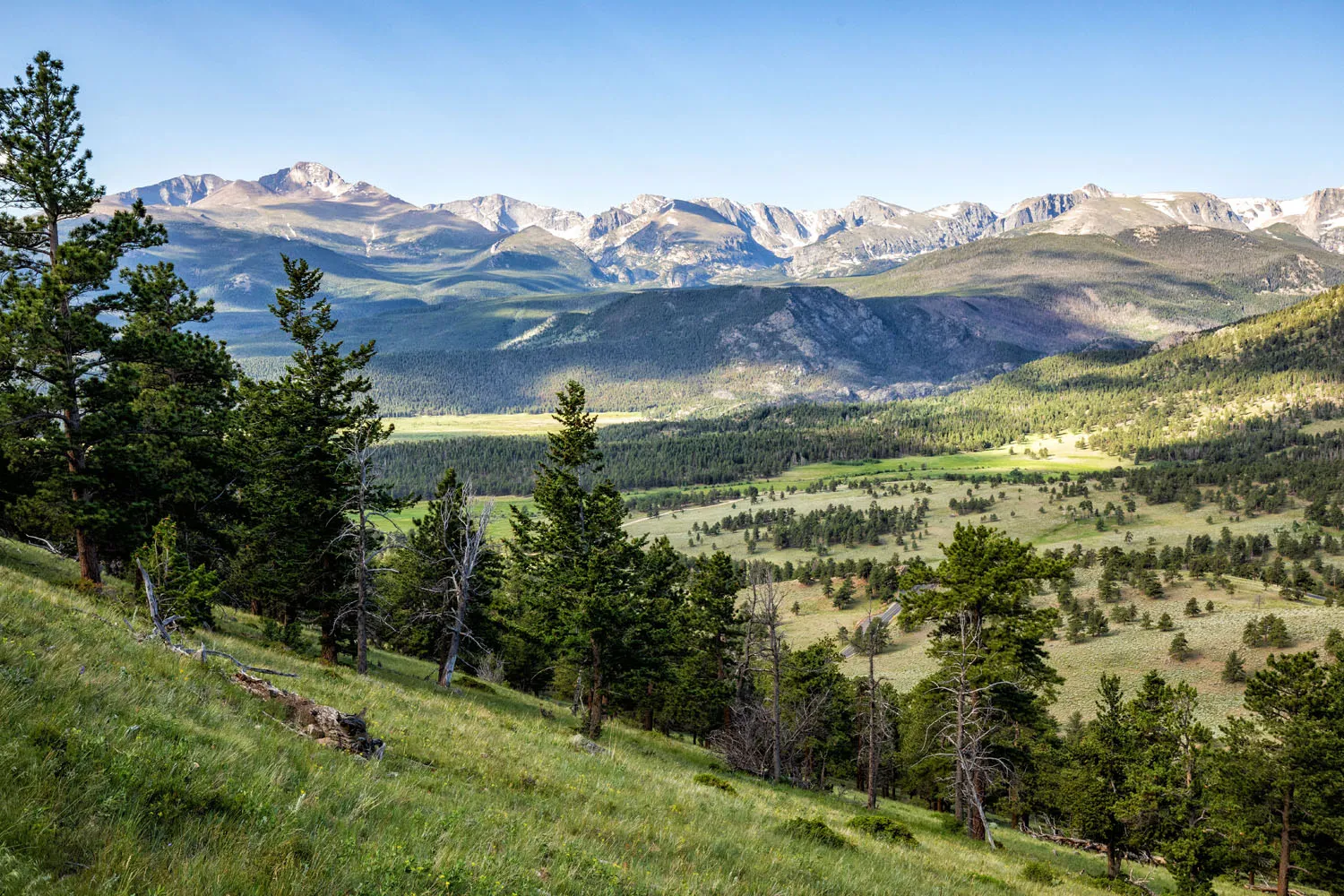
Overlooking Moraine Park from Deer Mountain | Best Things to Do in Rocky Mountain National Park
7. Holzwarth Historic Site
In 1917, John Holzwarth and his family, immigrants from Germany, built a small cabin on this site. Over the following years, they built several more cabins which were used for guests.
In 1974, the property was purchased by The Nature Conservancy and then became part of the national park. Visitors to the park can tour the property to learn more about the life of Colorado homesteaders.
During the summer months, volunteers offer daily tours of the Holzwarth site.
8. Old Fall River Road & Chasm Falls
Opened in 1920, Old Fall River Road was the first road that led into Rocky Mountain National Park.
This one-way, gravel road is 11 miles long and it takes about one hour to drive it. It starts in Horseshoe Park and ends at the Alpine Visitor Center. This road has numerous switchbacks and there are no guard rails. However, there are plenty of pull-offs to allow vehicles to pass. You do not need a 4×4, standard vehicles will do fine on this road.
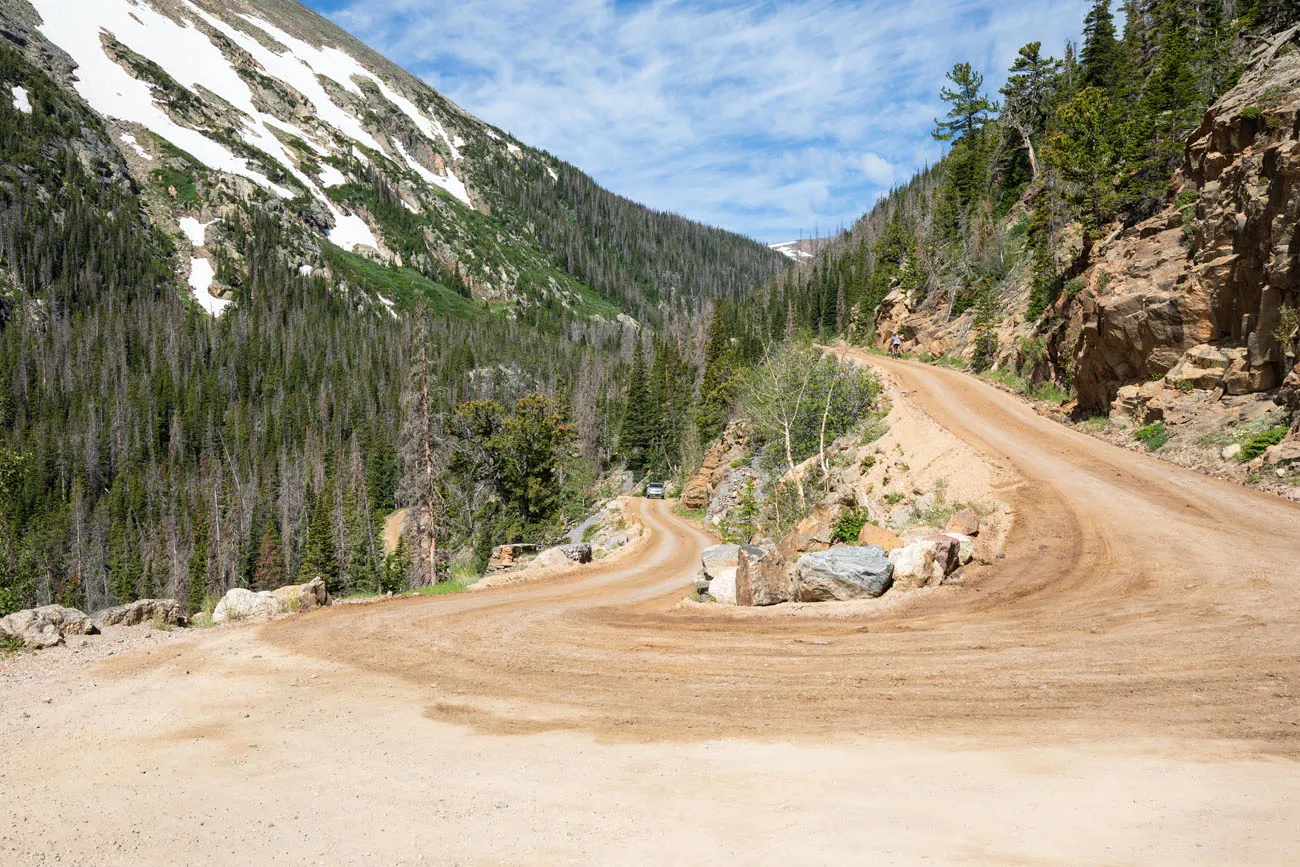
Old Fall River Road | Best Things to Do in Rocky Mountain National Park
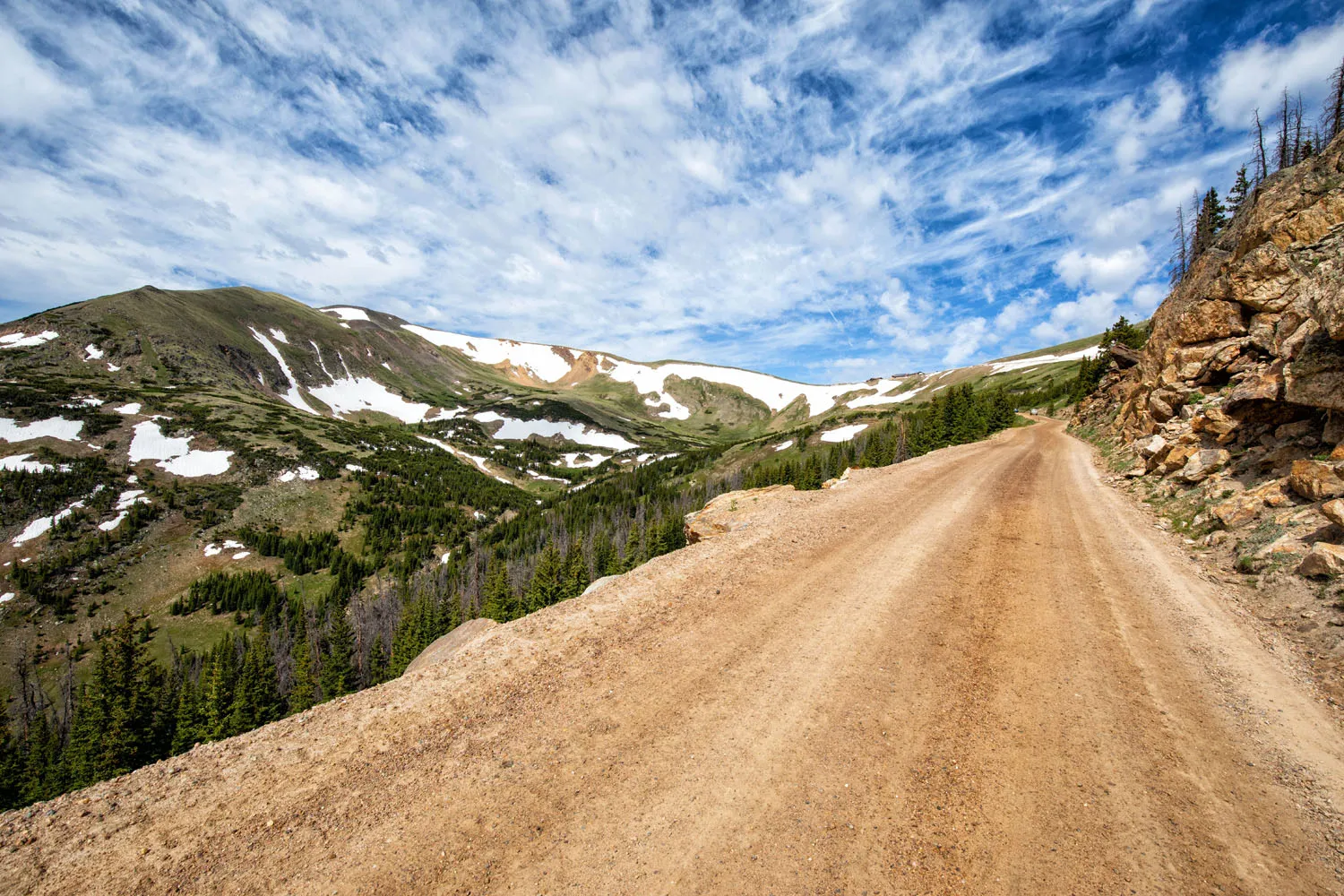
Along the drive, stop at Chasm Falls. From the parking area, it’s a very short walk to a viewpoint of this waterfall.
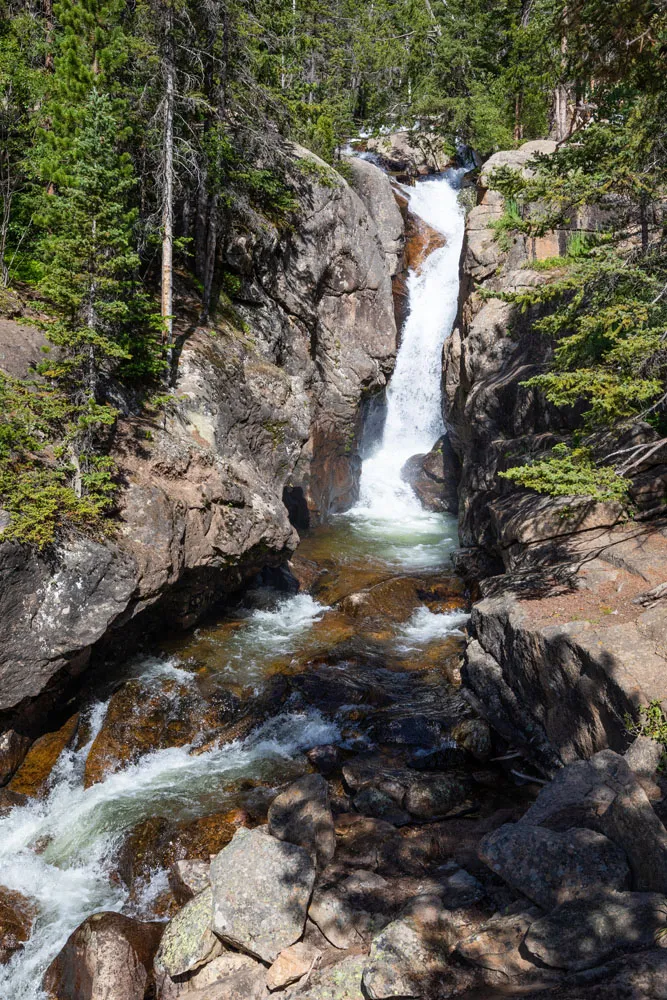
Chasm Falls | Best Things to Do in Rocky Mountain National Park
PRO TRAVEL TIP: Old Fall River Road is only open during the summer months. Get updates on road conditions on the National Park Service website.
9. Go Mountaineering
Rock climbing and mountaineering has long been a popular thing to do in Rocky Mountain National Park. With numerous peaks over 12,000 feet, 20 of these which sit above 13,000 feet, this park attracts climbers from around the world.
Activities range from bouldering to easy climbs to multi-day climbs up vertical cliffs. In the winter months, ice climbing is an option.
Before you go, check with the National Park Service website about bivouac permits and closures for raptor nesting.
10. Go Snowshoeing or Cross-Country Skiing
With its network of hiking trails, Rocky Mountain National Park is a great summer and fall destination. But it is also a great place to explore in the winter months.
From December through May, when much of the park is covered in snow, you can explore the park by snowshoeing or cross-country skiing. Many of the park trails are accessible by snowshoe. The subalpine regions and alpine tundra can be explored by cross-country skiing. If you have no experience snowshoeing, consider joining a free ranger-led program.
The winter months are a great time to visit Rocky Mountain National Park. Crowds will be low and with the snow, it will be magical.
PRO TRAVEL TIP: Avalanches are a possibility in the winter months. Before you hit the trail, visit the National Park Service website for updates on conditions.
Map of Things to Do in Rocky Mountain National Park
Here is a map of the best things to do in Rocky Mountain National Park.
How to Use This Map: Click the icons on the map to get more information about each point of interest. Click the star next to the title of the map to add this map to your Google Maps account. To view it on your phone or computer, open Google Maps, click the menu button, go to “Your Places,” click Maps, and you will see this map on your list.
Interesting Facts about Rocky Mountain National Park
Rocky Mountain National Park is one of the highest national parks in the USA. There are sixty mountain peaks over 12,000 feet and many of these top out over 13,000 feet. Longs Peak, at 14,259 feet, is the only fourteener in the park, but for serious hikers, getting to the top of this behemoth is one of the best things to do in Rocky Mountain National Park.
The Continental Divide runs north south through the park. You can cross the Continental Divide by foot or by driving Trail Ridge Road, the highest paved through road in the national park system.
Several ecological zones can be seen in the park. The lowest zone (Montane, from 5,600 to 9,500 feet) encompasses the meadows and the lower slopes of the mountains. Journey higher to the subalpine region (9,000 to 11,000 feet), into the evergreen forests and mountain lakes. The alpine tundra encompasses the highest areas of the park. Above 11,000 feet, trees disappear, temperatures drop, and wildlife becomes scarce. Approximately one-third of Rocky Mountain National Park is alpine tundra.
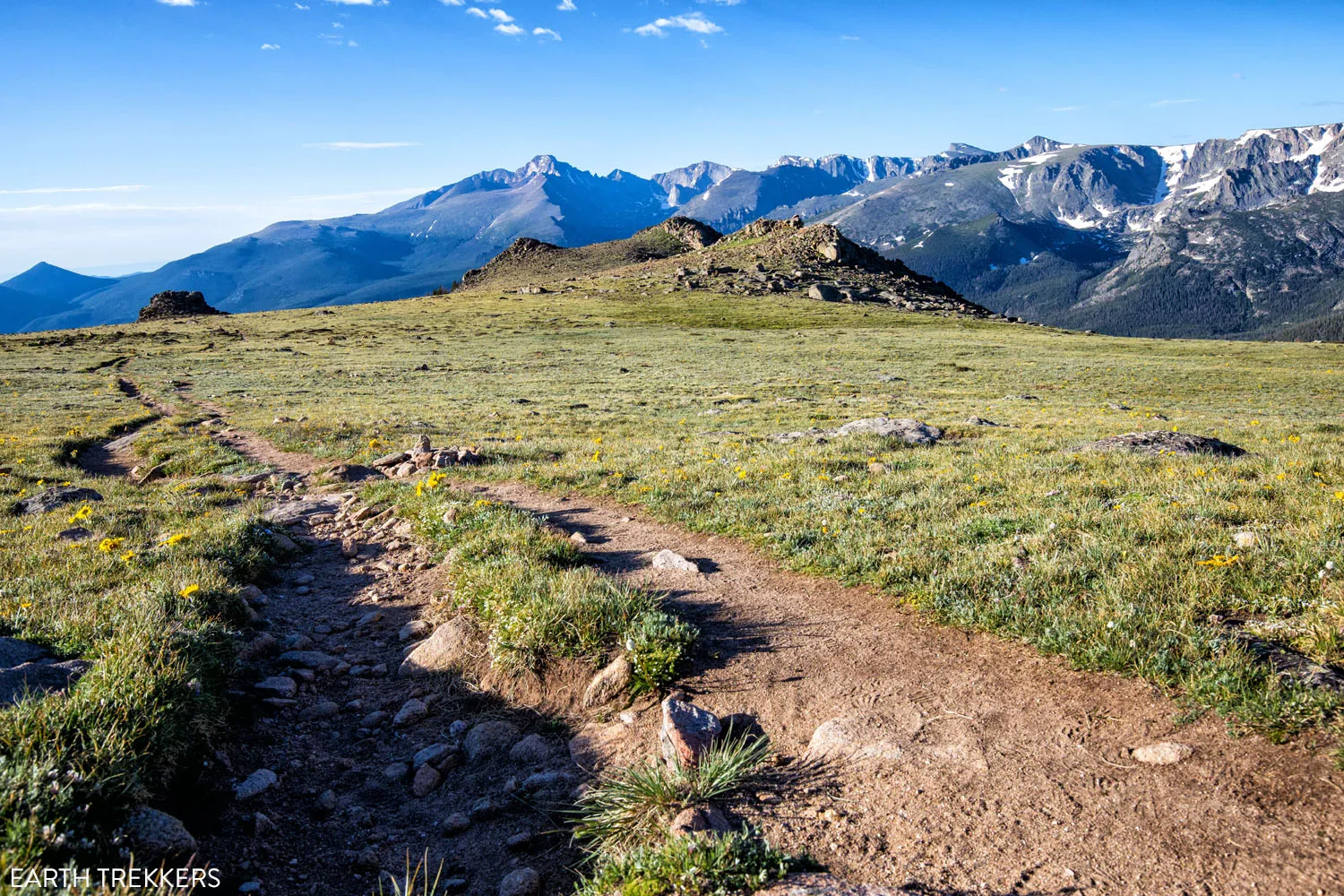
Alpine tundra (with Longs Peak and the Rocky Mountains in the background). This photo was taken on the Ute Trail to Tombstone Ridge.
Rocky Mountain National Park officially became a national park on January 26, 1915. In 1976, UNESCO designated this park as one of the world’s first Biosphere Reserves.
This is one of the most visited national parks in the USA. In 2023, 4.1 million people visited Rocky Mountain National Park, ranking it 5th by the number of visitors.
How Much Time Do You Need in Rocky Mountain National Park?
Due to its large size and abundance of hiking trails, you need at least a few days to explore Rocky Mountain National Park.
Ideally, plan on spending at least three days in Rocky Mountain National Park. This gives you enough time to drive Alpine Ridge Road, Old Fall River Road, and hike a few of the trails.
If you are an avid hiker, I recommend spending at least five days in Rocky Mountain National Park. This gives you enough time to acclimate to the higher elevation (very important if you live at a low elevation) before tackling some of the higher, tougher hikes (such as Mount Ida, Hallett Peak, or Longs Peak).
We spent one wonderful week in Rocky Mountain National Park in July. One week was perfect for us. This gave us enough time to hike at least one trail every day, with contingency time for bad weather. But even with a week here, there are still a lot of hikes left on our to-do list.
For more information on planning your time, we have a detailed post on how to plan your itinerary, with suggestions from several days up to 1 week. Or, if you have less time, we also have suggestions on how to spend one perfect day in Rocky Mountain National Park.
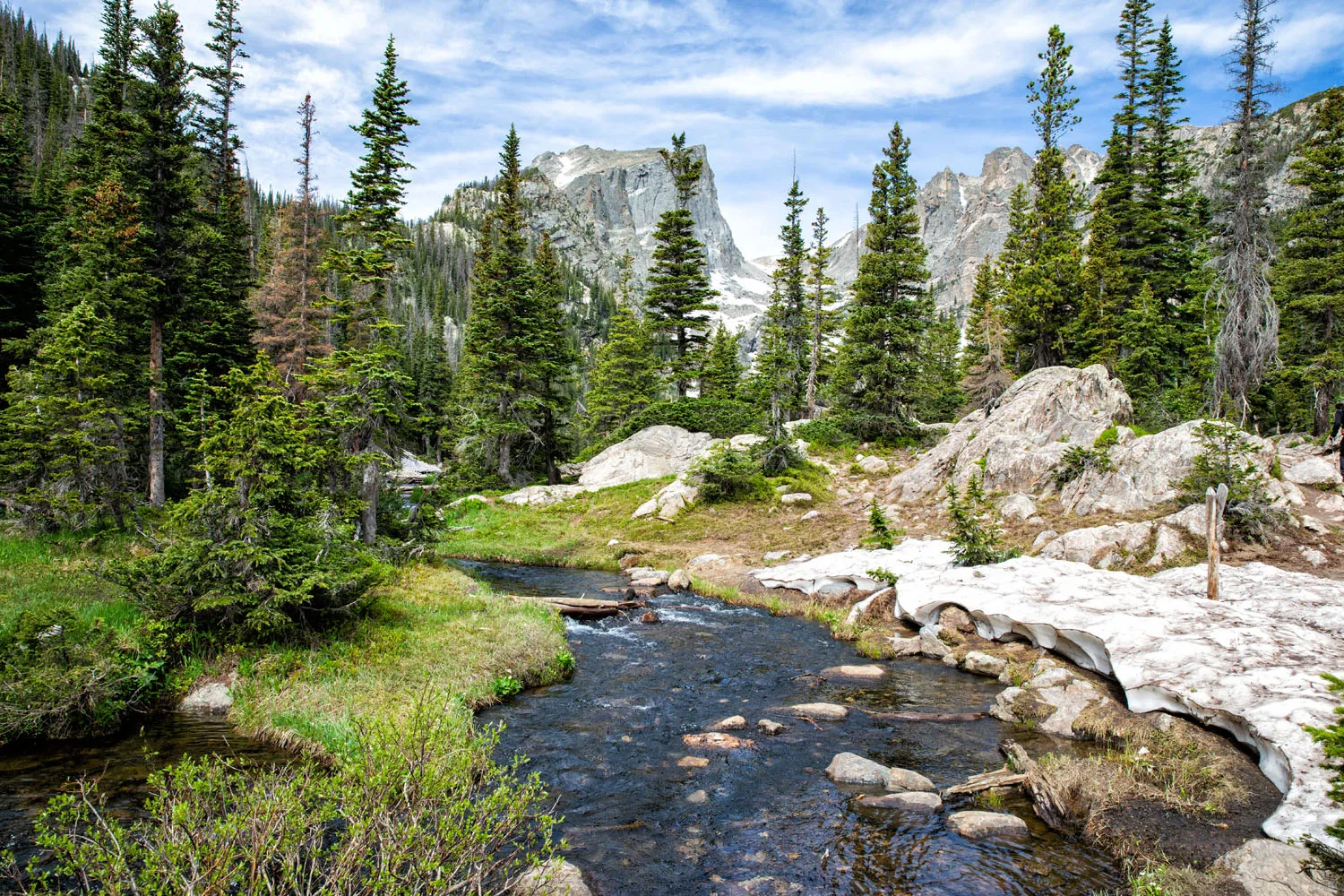
Rocky Mountain National Park in July…on the trail to Emerald and Dream Lakes
Best Time to Visit Rocky Mountain National Park
If you want full access to the park, which includes driving Trail Ridge Road and Old Fall River Road, plan your visit for the summer and early fall, when these roads are typically open. The summer months are the busiest months to visit Rocky Mountain National Park, but with warm temperatures and great weather, this is also one of the best times to go hiking.
Crowds can linger into autumn, as the leaves change color and pleasant weather continues to attract hikers.
Once the snow arrives, usually by mid to late autumn, crowds begin to diminish. Temperatures are low in the winter, but so are the crowds. This is a great time to explore Rocky Mountain National Park crowd-free and try out snowshoeing.
In the spring, warmer temperatures melt the snow and visitation picks up. Snow can linger on the higher trails all of the way into July, depending on snowfall levels for that year.
Rocky Mountain National Park appears in our Best US National Parks Month-By-Month series as a great park to visit in February, June, September, and October.
Shuttle Bus
During the busy summer months, a free shuttle service is provided by the national park service. These shuttle buses connect Moraine Park and Bear Lake, with numerous stops in between.
The parking lots at some trailheads fill up early in the day (notably Bear Lake and Glacier Gorge) but you can still reach these trailheads by shuttle bus if you arrive late. Park at the Park and Ride and take the Bear Lake Shuttle to these two trailheads.
Learn more on the National Park Service website.
Timed Entry Permit
To visit Rocky Mountain National Park from May 23 to October 19, 2025, you will need to reserve a permit in advance.
This has been implemented to limit crowds at the busiest sections of the park during the peak visitation season (the summer months). If you do not have a reservation, you will not be allowed to enter the park.
Reservations are made online on the recreation.gov website. Each daily reservation costs $2 per vehicle, which is in addition to the $25 daily entrance fee or $35 weekly entrance fee per vehicle.
There are two different types of timed entry permits.
Timed Entry + Bear Lake Road: This permit gives you access to everything in Rocky Mountain National Park. It includes Bear Lake Road and the hikes that start here (Bear Lake, Emerald and Dream Lakes, Alberta Falls, Sky Pond, Hallett Peak, and Sprague Lake). The permit is in effect from 5 am to 6 pm.
Timed Entry (Doesn’t include access to Bear Lake Road): This permit gives you access to everything in Rocky Mountain National Park except for Bear Lake Road. You can drive Trail Ridge Road, visit the Alpine Visitor Center, hike to Longs Peak and to Chasm Lake, and hike Gem Lake. The permit is in effect from 9 am to 2 pm.
Timed entry tickets become available about one month in advance with May 1 being the first release date.
The official National Park Service website lists when the permits become available and has more information about the permits. Visit recreation.gov to make your reservation.
Rocky Mountain National Park is one of eight US National Parks that require an advance reservation. For the full list, read our guide to the US National Parks that Require an Advance Reservation.
Practical Information
Park Hours: Park entrances are open 24 hours a day, 365 days per year.
Park Fee: $25 per vehicle, valid for 1 day. $35 for a weekly pass. If you plan to visit Rocky Mountain National Park along with other national parks, consider purchasing the America the Beautiful Pass ($80 and valid for all of the national parks for one year).
As you plan your trip and just before your visit, get updates on trail closures and park conditions on the National Park Service website.
Please practice the seven principles of Leave No Trace: plan ahead, stay on the trail, pack out what you bring to the hiking trail, properly dispose of waste, leave areas as you found them, minimize campfire impacts, be considerate of other hikers, and do not approach or feed wildlife.
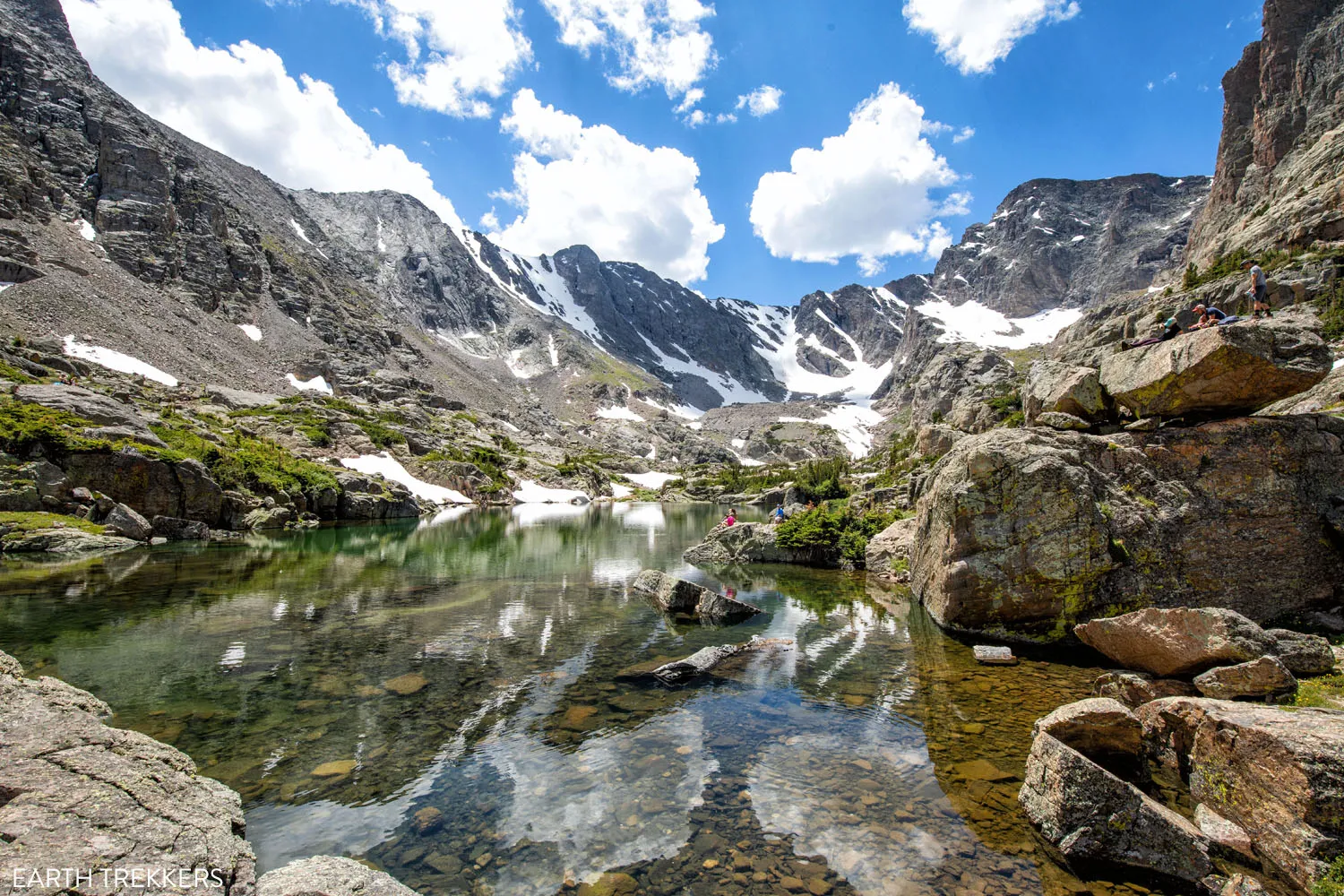
Lake of Glass (on the hiking trail to Sky Pond) | Best Things to Do in Rocky Mountain National Park
Where to Stay
In Rocky Mountain National Park
If you want to stay in the park, you will be limited to campgrounds. There is no lodging inside Rocky Mountain National Park. Aspenglen, Moraine Park, and Glacier Basin are the most popular campgrounds and these get reserved well in advance. Longs Peak and Timber Creek Campgrounds are easier to get reservations.
In Estes Park
With numerous hotels and restaurants, and a great location near the heart of Rocky Mountain National Park, Estes Park is a great place to stay.
The Stanley Hotel. This historic hotel is one of the top places to stay in Estes Park. This is the hotel that inspired Stephen King to write The Shining.
The Stanley Hotel offers a wide range of rooms. The rooms within the main hotel building get mixed reviews. Some visitors complain of noise and hot temperatures in the summer (there is no air conditioning). The Aspire rooms are higher-end, modernly decorated rooms but many people state that they are overpriced for what you get.
I recommend staying at The Residences. Take your pick from one, two, three, and four bedroom houses that come equipped with a full kitchen. Each residence is individually managed, so some are better than others. We stayed in a 3-bedroom house, #402, and it was perfect. Plenty of room, good WiFi, nice furnishings, and beautiful views from our balcony. I highly recommend this particular residence.
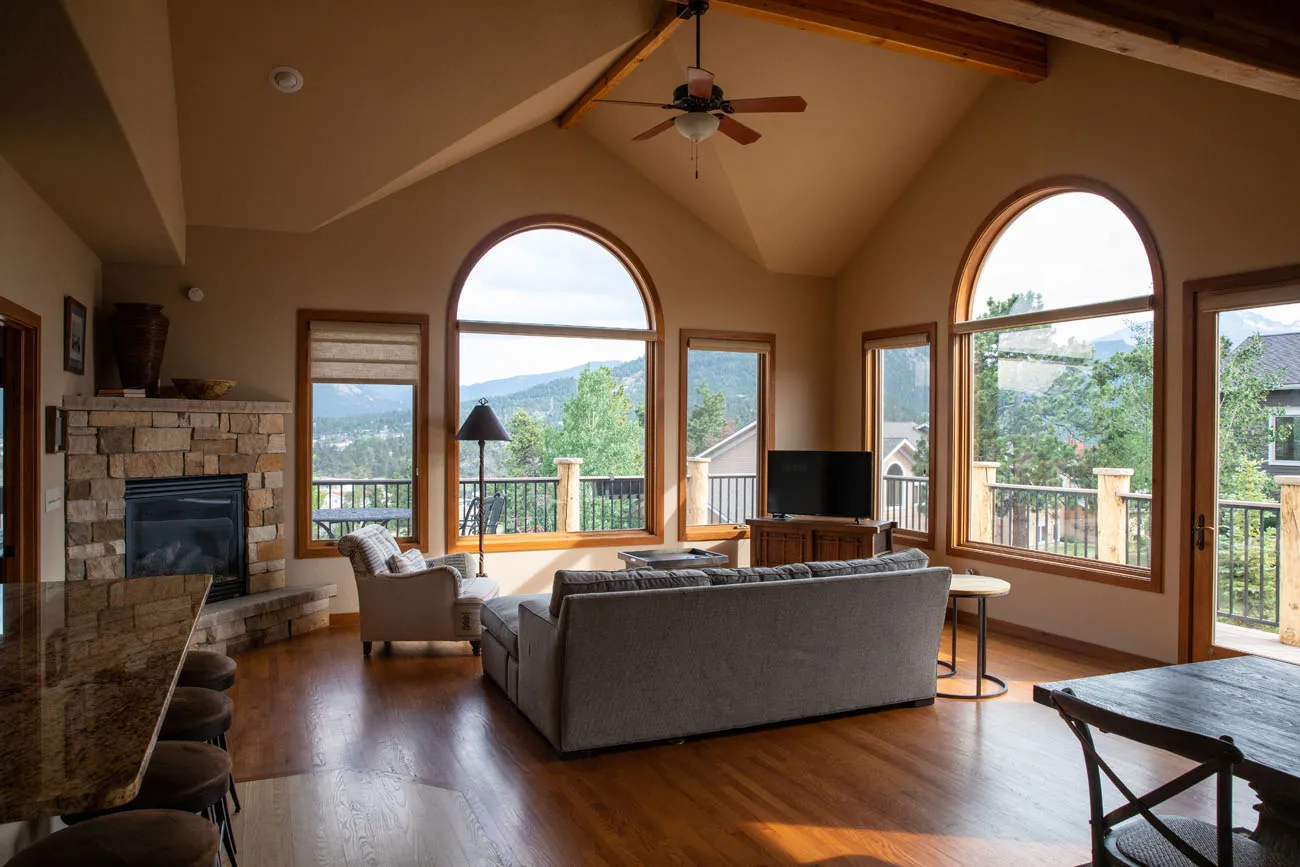
#402 Residence at The Stanley Hotel
WorldMark Estes Park. This very highly rated property offers two-bedroom apartments that can accommodate up to six people. It is located just outside of Estes Park, on the south side, an excellent location for driving into the park.
The Inn on Fall River & Fall River Cabins. This property is located west of Estes Park on Fall River Road, so you will have a longer drive to get into the heart of the park. However, this property gets rave reviews. You can stay in a cozy cabin with a river view or a well-decorated suite. There is even a three-bedroom house that can accommodate up to nine people.
For more information about what to do in Estes Park, including where to stay and where to eat, read our Guide to Estes Park.
Frequently Asked Questions
When is the best time to visit Rocky Mountain National Park?
If you plan to do a lot of hiking and drive Trail Ridge Road, plan on visiting Rocky Mountain National Park between Memorial Day and mid-October. Just be aware that this is also the busiest time to visit Rocky Mountain National Park.
If you want low crowds and don’t mind cold temperatures and snow, plan your visit from November through May. The park is much less crowded at this time, but Trail Ridge Road is not open and many, if not all, of the hiking trails can be snow covered. At this time, cross country skiing and snowshoeing are the main things to do in the park.
To see fall colors and the elk mating season, plan your visit from mid-September through mid-October.
How crowded does Rocky Mountain National Park get?
In 2022, Rocky Mountain National Park was the 4th most visited national park in the United States, with 4.3 million visitors. The vast majority of these people visited the park between Memorial Day and Labor Day.
The park has gotten so popular that in 2020 a timed entry system was put into effect. Between the end of May through early October, you must reserve a permit to visit the park. This helps control crowd levels on the roads and hiking trails.
How many days do you need in Rocky Mountain National Park?
Ideally, plan on spending at least three days in Rocky Mountain National Park. This gives you enough time to drive Alpine Ridge Road, Old Fall River Road, and hike a few of the trails. If you are an avid hiker, you could easily spend 5 to 7 days in the park and never run out of things to do.
More Information About Colorado
COLORADO: To read all of our articles about Colorado, check out our Colorado Travel Guide.
ROCKY MOUNTAIN NATIONAL PARK: Check out our Rocky Mountain National Park Travel Guide for important travel planning tips, sample itineraries, advice on when to go, where to stay, and more.
ESTES PARK: In our Guide to Estes Park, learn about where to stay, where to eat, and what to do.
MESA VERDE: Learn about the best things to do and how to plan your visit in our Guide to Mesa Verde National Park.
BLACK CANYON OF THE GUNNISON NATIONAL PARK: Check out our Black Canyon of the Gunnison National Park Travel Guide for important travel planning tips, sample itineraries, advice on when to go, where to stay, and more.
GREAT SAND DUNES: In our article Best Things to Do in Great Sand Dunes National Park, we cover the top experiences, plus how to plan your time, where to stay, and more.
COLORADO ITINERARY: With 10 days in Colorado, road trip to all four national parks (Rocky Mountain, Great Sand Dunes, Black Canyon of the Gunnison, and Mesa Verde), linking them together with some very scenic drives.
If you have any questions about the best things to do in Rocky Mountain National Park, let us know in the comment section below.
Visit More National Parks:
- GRAND TETON: 15 Best Things to Do at Grand Teton National Park
- CANYONLANDS: White Rim Road: The Ultimate Adventure in Canyonlands National Park
- GRAND CANYON: The Complete Guide to the Grand Canyon
- DEATH VALLEY: 5 Reasons Why Death Valley Should Be the Next National Park You Visit
- ARCHES: Devils Garden Trail: The Best Hike in Arches National Park
- DENALI: 16 Best Things to Do in Denali National Park
- LIST OF PARKS: Complete List of the US National Parks (+ FREE Printable Checklist)
Learn more about the US National Parks in our Guide to the National Parks.
Note: This post contains affiliate links. When you make a purchase using one of these affiliate links, we get paid a small commission at no extra cost to you.
All rights reserved © Earth Trekkers. Republishing this article and/or any of its contents (text, photography, etc.), in whole or in part, is strictly prohibited.
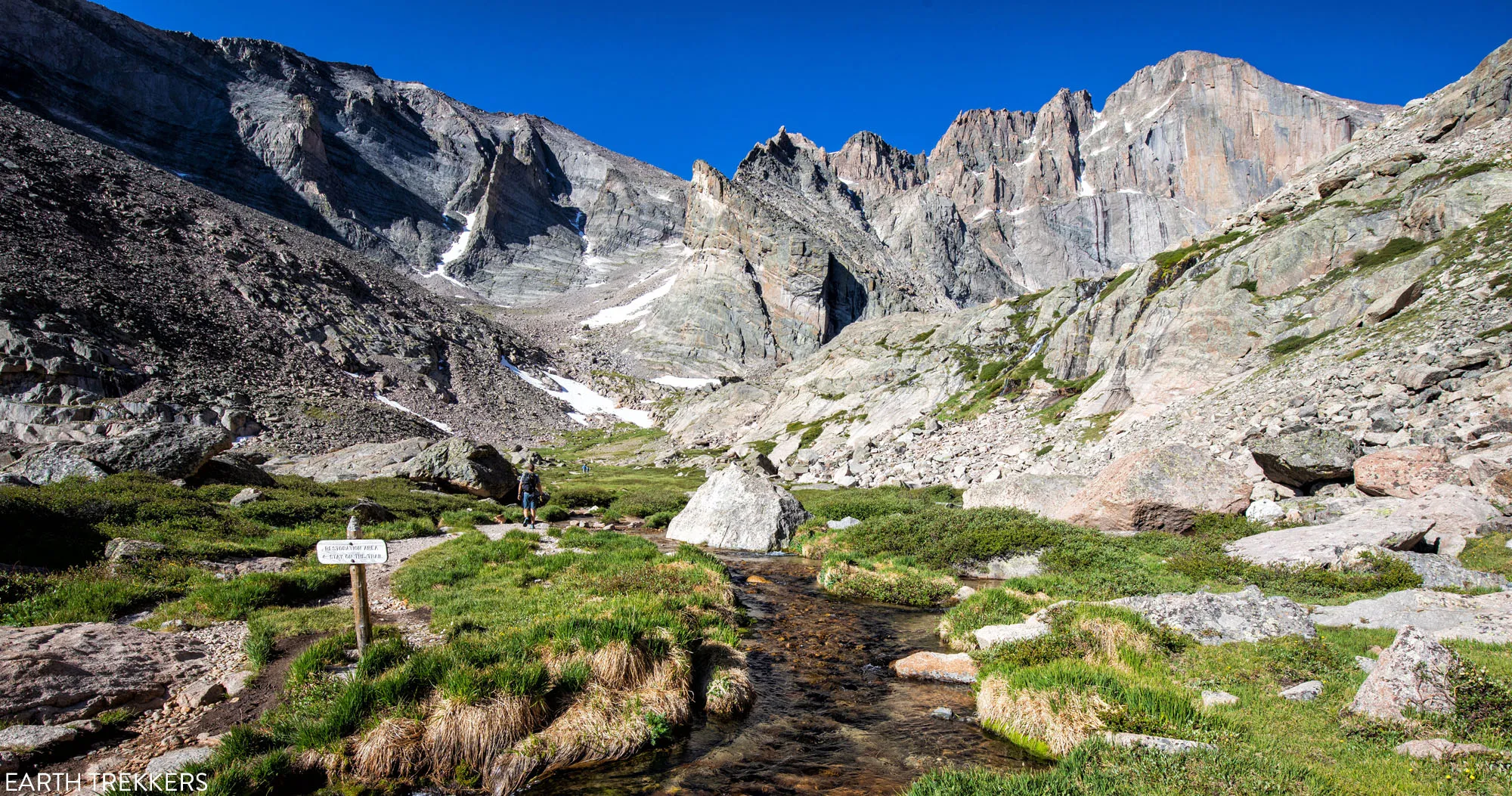
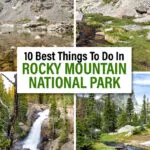



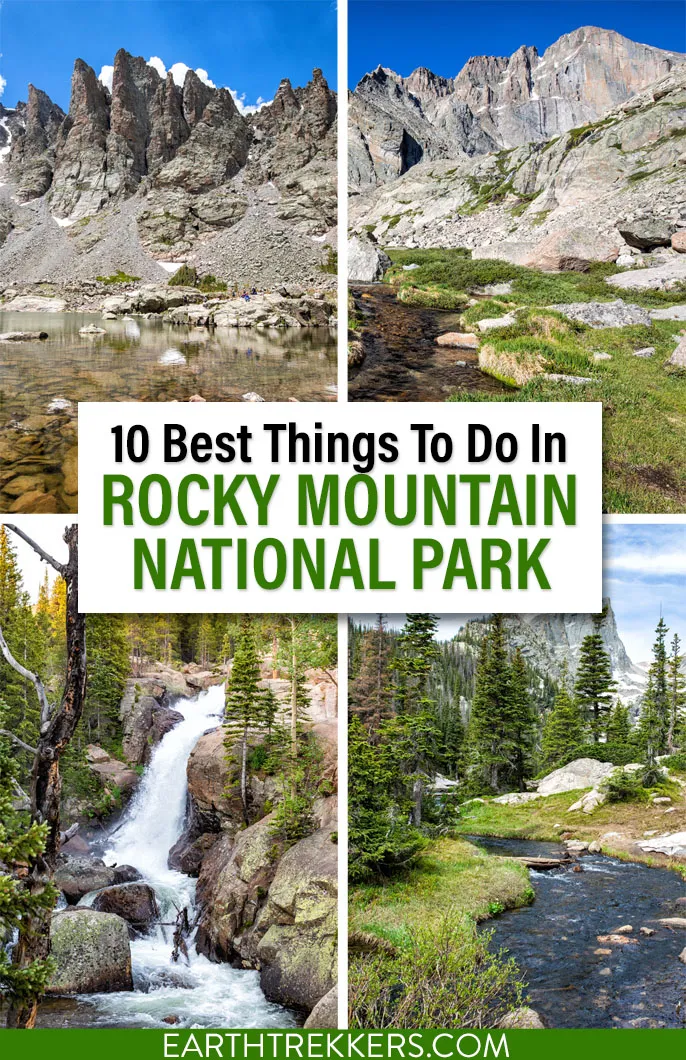
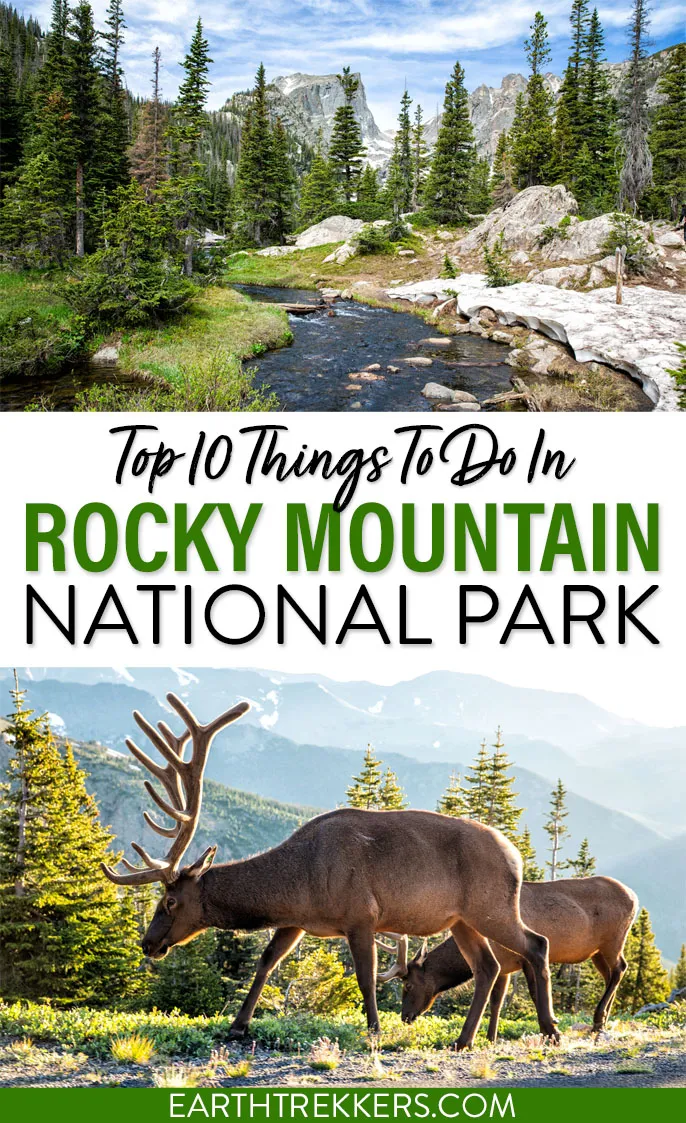
Comments 20